|
|
English Suites BWV 806-811
Bach’s English Suites
Contents
Recordings
Part 1
Part 2
Part 3
Part 4
Part 5
Part 6
Recordings
|
1 |
Bach: English Suites BWV 806-811 (Edition Bachakademie Vol 113) [K-1] |

|
|
English Suites BWV 806-811 [24:44, 21:15, 19:19, 19:12, 18:46, 26:01] |
|
Robert Levin (Piano) |
|
Hänssler |
Oct 1999 |
2-CD / TT: 128:17 |
|
Recorded at Tonstudio van Geest.
Buy this album at: Amazon.com | Amazon.com |
|
2 |
Bach: English Suites BWV 806-11 [K-9] |

|
|
English Suites BWV 806-811 [21:16, 20:57, 18:38, 20:03, 21:21, 26:23] |
|
András Schiff (Piano) |
|
Decca |
Jan 1988 |
2-CD / TT: 127:49 |
|
Recorded at Cambridge University Music School, England. 2nd recording of English Suite No. 4 BWV 809 by A.
Schiff. 1st recording of all other English Suites by A. Schiff.
Buy this album at: Amazon.com |
|
3 |
Bach: English Suites BWV 806-811 [K-12] |
 |
|
English Suites BWV 806-811 [22:37, 16:07, 13:05, 16:43, 16:23, 26:31] |
|
Glenn Gould (Piano) |
|
CBS / Sony |
Mar 1973 (1); May 1971 (2); Jun 1974 (3); Dec & May 1976 (4-5); Oct 1975 & May 1976 (6) |
2-CD / TT: 111:45 |
|
Recorded at Eaton's Auditorium, Toronto, Canada.
Buy this album at: Amazon.com | Amazon.com [1-3] | Amazon.com | Amazon.com [4-6] |



 |
|
4 |
J.S. Bach: English Suites BWV 806-811 [K-11] |
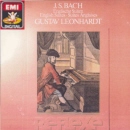 |
|
English Suites BWV 808-811 [15:43, 16:35, 13:46, 15:34, 14:51, 20:06] |
|
Gustav Leonhardt (Hapsichord) |
|
Virgin / EMI |
May, Oct 1984 |
2-CD / TT: 96:35 |
|
2nd recording of English Suites BWV 806-811 by G. Leonhardt. Recorded at Doopsgezinde Gemeente
Kerk, Haarlem, Holland.
Buy this album at: Amazon.com [Box Set] |

 |
|
5 |
J.S. Bach: English Suites BWV 806-811 (The Works for Harpsichord, Vol. 1) [K-1] |

|
|
English Suites BWV 806-811 [31:19, 24:42, 21:48, 24:37, 23:52, 31:02] |
|
Peter Watchorn (Harpsichord) |
|
Titanic 254
Musica Ominia MO-0206 |
Oct 6&8, 1997 |
2-CD / TT: 157:21 |
|
Recorded at New Hope Methodist Church, Methuen, Massachusetts, USA.
Review: New Bach English Suites from Titanic
Buy this album at:
Titanic CD: Amazon.com | Amazon.co.uk | Amazon.de
Musica Omnia CD: Amazon.com | Amazon.co.uk | Amazon.de
Musica Omnia Music Download: Amazon.com | Amazon.co.uk | Amazon.de |

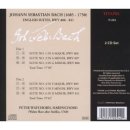
 |
|
6 |
J.S. Bach: Partita No. 1 · English Suite No. 3 · French Suite No. 2 [K-1] |
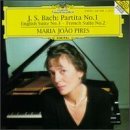
|
|
English Suite No. 3 BWV 808 [24:22] |
|
Maria-João Pires (Piano) |
|
Deutsche Grammophon |
Jan 1994 |
CD / TT: 57:43 |
|
Recorded at Großer Saal, Hoschschule für Musik, München, Germany.
Buy this album at: Amazon.com |
|
8 |
J.S. Bach: Toccata BWV 911 · Partita BWV 826 · Englische Suite No. 2 BWV 807 [K-2]
Matha Argerich Collection: Chopin, Bach - Solo Works |
 |
|
English Suites No. 2 BWV 807 [20:10] |
|
Martha Argerich (Piano) |
|
Deutsche Grammophon |
Feb 1979 |
CD / TT: 50:16 |
|
Recorded at Studio Lankwitz, Berlin, Germany.
2nd recording of English Suite No. 2 BWV 807 by M. Argerich.
Buy this album at: Amazon.com | Amazon.com |
 |
|
9 |
Bach Recital [K-2] |

|
|
English Suite No. 2 BWV 807 [20:31] |
|
Mieczyslaw Horszowski (Piano) |
|
Arbiter |
Jul 1984 |
CD / TT: 77:06 |
|
Recorded at Chiesa di San Martino, Castagno d'Andrea, Tuscany, Italy.
Buy this album at: Amazon.com |
|
10 |
Bach: Englische Suiten 2 & 3; Scarlatti: 4 Sonaten [K-1] |

|
|
English Suite No.2 in A minor, BWV 807 [28:36]
English Suite No.3 in G minor, BWV 808 [27:28] |
|
Ivo Pogorelich (piano) |
|
Deutsche Grammophon |
Oct 1985 |
CD / TT: 75:32 |
|
Recorded at Salle de Musique, Le Chaux de Fonds, Switzerland. 1st recording of English Suites Nos. 2-3 BWV 807-808 by I.
Pogorelich.
Buy this album at: Amazon.com | Amazon.com | Amazon.de | Amazon.de |
|
11 |
Bach: English Suite; Chopin: Nocturnes; Beethoven: Sonata [K-8] |
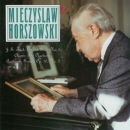
|
|
English Suite No. 5 BWV 810 [22:23] |
|
Mieczyslaw Horszowski (Piano) |
|
Nonesuch |
May 1989 |
CD / TT: 49:07 |
|
Recorded at Curtis Hall, The Curtis Institute of Music, Philadelphia, PA, USA.
3rd recording of English Suite No. 5 BWV 810 by M. Horszowski.
Buy this album at: Amazon.com |
|
12 |
J.S. Bach: Italianisches Konzert, Englische Suite No. 6, Toccata BWV 911, 4 Duette BWV 802-805 [K-1] |
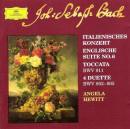
|
|
English Suite No. 6 BWV 811 [26:37] |
|
Angela Hewitt (Piano) |
|
Deutsche Grammophon |
1985 |
CD / TT: 62:01 |
|
Recorded at La Chaux-de-Fonds, Salle de Musique. 1st recording of English Suite No. 6 BWV 811 by A. Hewitt.
Buy this album at: Amazon.com | Amazon.com |
Part 1
Donald Satz wrote (September 15, 2000):
Bach's English Suites were written before the French Suites and the Partitas for Harpsichord. Although the exact dates of composition are not known, academic research is increasingly tracing their origin to Bach's years at Weimar (1708-1714) when he was a young man. The music readily mixes French and Italian musical elements and styles with Bach's counterpoint. Nobody knows for sure why these are called English Suites, but the musical content has no relation to anything English.
I have six full sets for comparison:
[1] Robert Levin on Hänssler 92113 (1999).
[2] Andras Schiff on Decca 421640 (1988).
[3] Glenn Gould on Sony 42268 (1977).
[4] Gustav Leonhardt on EMI 49000 (1985).
[5] Peter Watchorn on Titanic 254 (1999).
[6] Murray Perahia on Sony 60276 & 60277 (1998).
Other recordings compared are:
[7] Suite No. 3 - Maria Joao Pires - DG 447894 (1995).
[8] Suite No. 2 - Martha Argerich - DG 423880 (1980).
[9] Suite No. 2 - Mieczyslaw Horszowski - Arbiter 113 (1984).
[10] Suites Nos. 2 & 3 - Ivo Pogorelich - DG 415480 (1986).
[11] Suite No. 5 - Horszowski - Nonesuch 79232 (1990).
[12] Suite No. 6 - Angela Hewitt - DG 419218 (1986).
English Suite No. 1 in A major, BWV 811 - Each suite starts with a prelude, and this one is outstanding music which constitutes Counterpoint Heaven. It begins with a exciting flourish, then settles into a somewhat restrained yet joyful mode of fairly constant tempo and volume. At least, that's my perception from Leonhardt's performance which is the one I'm initially most familiar with and hum from time to time. I've loved Leonhardt's version for many years and have considered it my standard. His accenting and pacing are excellent, and the joy/good nature of the music stands out in his reading; he is bouyant and sparkling.
Watchorn is slower, richer, and concentrates more than Leonhardt on the beauty of the music. His version is equally rewarding - two great performances.
Gould has a different take on the Prelude than Leonhardt or Watchorn. He is very slow, incisive, and highly poetic. His counterpoint is superb; softer passages are very poignant. This is not your typical Gould performance, but a freely poetic one to luxuriate in. He's not interested in beauty, spark, or richness, but in finding the music's core from within. Initially, I wouldn't have thought that I'd prefer any version to Leonhardt's, but Gould wins my heart convincingly. He has clearly analyzed the Prelude inside and out, delivering his own conception which I find superior to Leonhardt's which now seems somewhat one-dimensional in comparison.
Levin is as as good as Leonhardt and Watchorn. Although his flourish is a thrill, his reading is basically laid-back and the most beautiful of all. Levin's bass line is particularly stunning. In many respects, his performance reminds me of Edward Aldwell at his best.
That leaves Schiff and Perahia. As with Levin, Schiff is laid-back but does not deliver as lovely a reading. Also, his flourish is rather weak. Perahia starts off excellently with some real fire in the reading; he continues this way until the middle of the movement when he gets soft-focused; I lost focus. Toward the end of the movement, he returns to his vigorous ways. He and Schiff give very good renditions, but the competition is tremendously strong in the Prelude.
The second movement Allemande is elegant and stately music which unfolds many beauties with a tinge of urgency. It is ultimately uplifting in spirit. Gould's not the man to stay in the slow lane for long, and he races through the Allemande with mixed results. His first theme is very musical and enjoyable, but in the second theme he goes "over the wall" with eccentric and unmusical phrasing.
The other versions are excellent; my preference is Levin who dispenses with a "tinge" of urgency and displays it proudly; I think it works very well. Watchorn and Leonhardt are models of elegance with incisive urgency; both readings are on the slow side. Perahia and Schiff are faster with exquisite poetry.
Next is a series of four French-style Courantes: I, II, and two Doubles which are ornamented versions. Except for Gould, the versions are fairly similar and successful. Actually, Levin is more than merely successful with another highly urgent reading as in the Allemande. But that presents a problem. Combining the Allemande and the series of Courantes results in almost ten minutes of constant and up-front urgency. It just gets too heavy for the material with little variety. Levin needs to pick his spots for urgency instead of bludgeoning the listener without relief.
Moving from the five versions to Gould's is like leaving terra firma and drilling down to the Earth's center. Gould uses a slow tempo and superb pacing. His is the only account that is ceremonial and regal in nature, and I love this approach. The counterpoint is amazing as well. His performance reminds me some of a great Tureck interpretation - slow with incisive depth. It's such a pleasure just to listen to Gould's part playing and the staccato and legato regimen Gould uses for each hand. The second Double is particularly fine with the left hand's walking staccato. This is masterful music in Gould's hands, simply excellent with the other performers.
The Sarabande is lovely music which is introspective and heavily ornamented. As with so many Bach pieces, this one keeps sounding better with additional listening. The four piano versions are very similar to one other in terms of tempo and pacing; just a few seconds separate them in a four minute movement. And each version is a mighty fine listening experience. Which performance to prefer is largely a matter of ornamentation preference. I favor Andras Schiff; his reading is most poignant, and he makes all the right moves with ornamentation. There are two "descending" passages with about 2 and 1 minutes remaining in the movement, and Schiff plays them exquisitely. However, I don't want to minimize the other versions; they are excellent, aany one of them will provide the essence of the music.
Leonhardt and Watchorn also deliver the essence, but at this point I need to make a big deal out of repeats. The only time I downgrade a performance not having repeats is when I do not have a feeling of completeness from the interpretation. That's the situation with Leonhardt. This Sarabande, in my view, is the wrong music to decide to discard repeats of themes. Each part of the piece is essential in order to reach a sense of completion at the end. I consider it analogous to reading a novel which has pages ripped out; I've been cheated. There *is* always the potential for the artist to skip repeats and basically tell a different story which does feel complete, but Leonhardt doesn't come close in the Sarabande.
It's Perahia's time to shine in the Bourree I & II. Contrast is a very important and prevalent element in music, and is fully displayed in this movement. Bourree I is joyous and outgoing; II is menacing, sinister, and urgent. I is in a major key, II in a tonic minor. I is in a higher register than II, and II has a strong and even dominating bass line. The change from I to II is immediate, thorough, and abrupt; it's very important that the listener feel that an entirely new world has been entered in a flash. Perahia does all this superbly. His Bourree I is very joyous and thrilling; II is another thrill with emotions immediately nosediving into the underworld.
Levin and Leonhardt well stand up to scrutiny; they just aren't as magnificant as Perahia throughout, although Levin's Bourree II is the best of all. Schiff, Watchorn, and Gould don't give me that immediate and thorough changeover. Schiff's bass line creates little impact, Watchorn is too slow in Bourree I, and Gould's bass line is eccentric and a little non-musical.
A two-voice gigue concludes Suite No. 1. This is feel-good music to the core which can be exciting and possess controlled wildness. It needs to be rather light in texture to fully bring out the joy. Watchorn and Levin deliver sensational performances which render the other versions superfluous. Levin's the exciting one; his combination of thrill and happiness is a major mood enhancer. His counterpoint is exceptional. Watchorn has the same effect on me, although he uses a much slower tempo and eschews providing any excitement. Instead, he gives the music a stately joy. Also, there is a swaying ending to each theme and its repeat (in different registers) which only Watchorn makes a special listening experience.
Perahia is much too heavy for the music; another negative is that when he does get soft-focused, it's at the wrong time. And there's a third problem; I do believe Perahia is providing some humor, and I find it annoying. Leonhardt polishes off the Gigue in a little over one minute (repeats); again, not a complete story. Schiff is "twinkle toes" on this one, being too delicate and dainty throughout. Gould has some good moments, but his reading is overly choppy and he engages in some excessive posturing.
I'm very impressed with these performances of Suite No. 1, and the differences in quality between my favorite version (Levin) and the least enjoyable (Leonhardt & Schiff) are relatively small. Although Gould's Prelude and Courante are transcendent readings, he's just as likely to barely tread water in some other movements. So far, the surprise to me is how good Watchorn is doing. His set is identified as volume 1 of Bach's keyboard works. Since this set was issued well over a year ago, I am assuming that the project has been scratched.
Suite No. 1 is an outstanding work, and it's been a great pleasure listening to the different versions. For Suite No. 2, Pogorelich, Argerich, and Horszowski join the basic group.
Continue on Part 2
English Suites BWV 806-811 : Part 1 | Part 2 | Part 3 | Part 4 | Part 5 | Part 6 | English – Hewitt | English – Perahia Vol. 2 | English - Rousset | English - Watchorn | Rübsam – Part 4
|
|
|